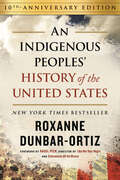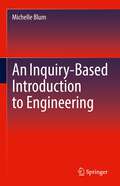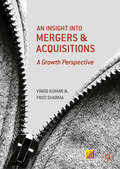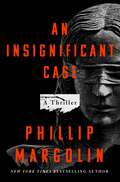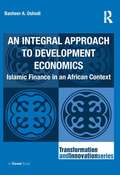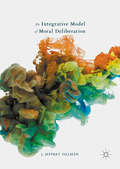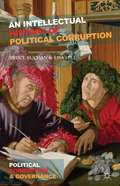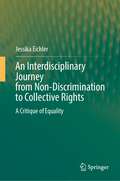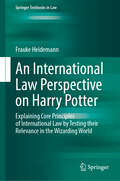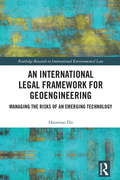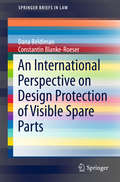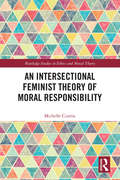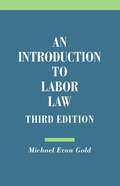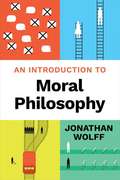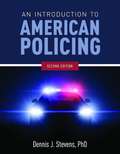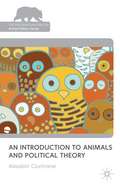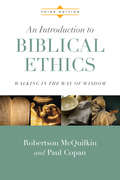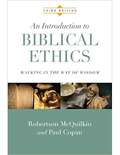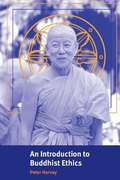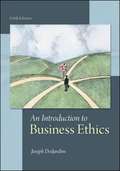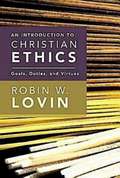- Table View
- List View
An Indigenous Peoples' History of the United States (ReVisioning History)
by Roxanne Dunbar-OrtizNew York Times BestsellerNow part of the HBO docuseries "Exterminate All the Brutes," written and directed by Raoul PeckRecipient of the American Book AwardThe first history of the United States told from the perspective of indigenous peoples Today in the United States, there are more than five hundred federally recognized Indigenous nations comprising nearly three million people, descendants of the fifteen million Native people who once inhabited this land. The centuries-long genocidal program of the US settler-colonial regimen has largely been omitted from history. Now, for the first time, acclaimed historian and activist Roxanne Dunbar-Ortiz offers a history of the United States told from the perspective of Indigenous peoples and reveals how Native Americans, for centuries, actively resisted expansion of the US empire.With growing support for movements such as the campaign to abolish Columbus Day and replace it with Indigenous Peoples&’ Day and the Dakota Access Pipeline protest led by the Standing Rock Sioux Tribe, An Indigenous Peoples&’ History of the United States is an essential resource providing historical threads that are crucial for understanding the present. In An Indigenous Peoples&’ History of the United States, Dunbar-Ortiz adroitly challenges the founding myth of the United States and shows how policy against the Indigenous peoples was colonialist and designed to seize the territories of the original inhabitants, displacing or eliminating them. And as Dunbar-Ortiz reveals, this policy was praised in popular culture, through writers like James Fenimore Cooper and Walt Whitman, and in the highest offices of government and the military. Shockingly, as the genocidal policy reached its zenith under President Andrew Jackson, its ruthlessness was best articulated by US Army general Thomas S. Jesup, who, in 1836, wrote of the Seminoles: &“The country can be rid of them only by exterminating them.&” Spanning more than four hundred years, this classic bottom-up peoples&’ history radically reframes US history and explodes the silences that have haunted our national narrative.An Indigenous Peoples' History of the United States is a 2015 PEN Oakland-Josephine Miles Award for Excellence in Literature.
An Inquiry-Based Introduction to Engineering
by Michelle BlumThe text introduces engineering to first-year undergraduate students using Inquiry-Based Learning (IBL). It draws on several different inquiry-based instruction types such as confirmation inquiry, structured inquiry, guided inquiry, and open inquiry, and all of their common elements. Professor Blum’s approach emphasizes the student’s role in the learning process, empowering them in the classroom to explore the material, ask questions, and share ideas, instead of the instructor lecturing to passive learners about what they need to know. Beginning with a preface to IBL, the book is organized into three parts, each consisting of four to ten chapters. Each chapter has a dedicated topic where an initial few paragraphs of introductory or fundamental material are provided. This is followed by a series of focused questions that guide the students’ learning about the concept(s) being taught. Featuring multiple inquiry-based strategies, each most appropriate to the topic, An Inquiry-Based Approach to Introduction to Engineering stands as an easy to use textbook that quickly allows students to actively engage with the content during every class period.
An Insight into Mergers and Acquisitions: A Growth Perspective
by Vinod Kumar Priti SharmaThis book provides an insight in the phenomenon of Mergers and Acquisitions (M&A), including the various forms of corporate restructuring. It highlights the importance of M&A as a strategy for faster growth in the corporate. The book provides an enriched experience of the art of valuation with detailed description of M&A process, deal structuring and financing. The book also provides the broader perspective of Accounting and Regulatory aspects of M&A. While covering the conceptual underpinnings of M&A, the book supplements it with real life examples on each sub-topic with various numeric examples. Thus the judicious blend of theory and practical aspects, through numerical as well as real life case-studies, make the book a source of vast knowledge in the complicated and dynamic world of M&A.
An Insignificant Case: A Thriller
by Phillip MargolinA new standalone legal thriller from the international bestselling author of GONE, BUT NOT FORGOTTEN.Charlie Webb is a third rate lawyer who graduated from a third rate law-school and, because he couldn’t get hired by any of the major law firms, has opened his own law firm, where he gets by handling cases for dubious associates from his youth and some court appointed cases. Described as “a leaky boat floating down the stream of life,” Charlie has led unremarkable life, personally and professionally. Until he’s appointed to be the attorney for a decidedly crackpot artist who calls himself Guido Sabatini (born Lawrence Weiss). Sabatini has been arrested – again – for breaking into a restaurant and stealing back a painting he sold them because he was insulted by where it was displayed. But as Lawrence Weiss, he’s also an accomplished card shark and burglar and while he was there, he stole a thumb drive from the owner’s safe.Not knowing what else Sabatani has stolen, Webb negotiates the return of the painting and “other items’ for the owner dropping charges against Sabatini. But the contents of the flash drive threatens very powerful figures who are determined to retrieve it, the restaurant owner (Gretchen Hall) and her driver (Yuri Makarov) are being investigated for the sex trafficking of minors, and there are others who have a violent grudge against Sabatini. When a minor theft case becomes a double homicide, and even more, Charlie Webb, an insignificant lawyer assigned to an insignificant case, is faced with the most important, and deadliest, case of his life. Going back to his long-time bestselling roots, Phillip Margolin returns with a brilliant standalone legal thriller in the tradition of John Grisham.
An Inspector Recalls: Memoirs of a Railway Detective
by Graham SatchwellBorn in inner-city Birmingham, from an ‘impeccable working class pedigree’, Graham Satchwell was diagnosed with a serious illness at age 7 – a condition which should have barred his entry to the police force. Forty-two years later, he was Britain’s senior-most railway detective. In a career that encompassed every CID rank and involved some of the country’s toughest gangsters, petty thieves, bomb threats, terrorism, the odd politician and even the Queen, Graham Satchwell has seen it all. Infused with humour and genuine down-to-earth wisdom, An Inspector Recalls is a frank and intimate account of a life spent on the frontier between crime and punishment that recalls the gangsters, politics and often-questionable police culture of the 1970s, ’80s and ’90s.
An Institutional Approach to the Responsibility to Protect
by Gentian Zyberi Kevin T. MasonCovering the main political organs of the UN, important regional and security organizations, international judicial institutions and the regional human rights protection systems, An Institutional Approach to the Responsibility to Protect examines the roles and responsibilities of the international community regarding the responsibility to protect. It also proposes improvements to the current system of collective security and human rights protection.
An Integral Approach to Development Economics: Islamic Finance in an African Context (Transformation and Innovation)
by Basheer A. OshodiDeveloping economies such as those in sub-Saharan Africa are searching for realistic economic policy prescriptions. Despite economic growth in countries like Nigeria, poverty and unemployment blight the lives of many, in the midst of plenty. Simultaneously, much neo-classical economic thought is being questioned against the backdrop of global economic meltdown, giving rise to inquiry about more integral approaches to sustainable development. In An Integral Approach to Development Economics, Basheer Oshodi examines modernization theories, dependency theories, world system theories and emerging 21st century economic theories and links a neo-modern mix of economic thought with the practicalities of finance in parts of the World where poverty is rife. In a specifically African setting, over half of the population are Muslims, Oshodi considers Islamic finance in the context of the triple heritage of indigenous culture, Westernized Christianity, and Islam. He argues that the principles of Islamic banking and finance can be integrated with other elements of that heritage, focusing on meeting the challenges of poverty and unemployment. Islamic finance is not just a religiously-oriented, Sharia-compliant, alternative financial model. It can contribute to overall socio-economic transformation and a wider, people-centred approach to economic development. International organizations, financial institutions, reserve banks, policy makers, donor agencies and students will find resonance in this valuable addition to Gower’s Transformation and Innovation Series.
An Integrative Model of Moral Deliberation
by J. Jeffrey TillmanAn Integrative Model of Moral Deliberation suggests that the inadequacy of models of moral deliberation to deal effectively with contemporary moral complexity is a result of the lack of an inadequate theory of moral cognition. Drawing from work in neuroscience, evolutionary psychology, social theory, dual process cognitive theory, and the work of William James, this book develops a theory of moral cognition to be used as the basis for a model of moral deliberation. This model portrays moral deliberation as a back and forth movement between intuitive and analytic cognitions, by which narrative scenarios are constructed and then assessed by aesthetic sensibilities.
An Intellectual History of Political Corruption
by Lisa Hill Bruce BuchanFew concepts have witnessed a more dramatic resurgence of interest in recent year than corruption. It is, however, a concept that dates back to antiquity with this recent popularity representing the latest iteration in a long history of contestation over corruption. In one of the first surveys of the variable contours of meaning invested in the term, from antiquity through to the end of the eighteenth century, this book explores the significant role corruption has played in political discourse through the centuries. It finds that corruption was not always a concept particular to the abuse of public office, but was often applied to more nebulous fears of moral, spiritual and physical degeneration. This book marshals both historical and conceptual analysis to demonstrate a conceptual oscillation between restrictive 'public office' and expansive 'degenerative' connotations of corruption that persisted until the second half of the eighteenth century when the public office conception overtook and finally superseded the degenerative one. The result is a survey that is fundamental to the understanding of modern ideas of corruption and represents an invaluable tool to both students and scholars of the subject.
An Interdisciplinary Journey from Non-Discrimination to Collective Rights: A Critique of Equality
by Jessika EichlerThis book develops a critique of the equality paradigms and principles to be found in the majority of today’s legal orders. It accompanies the reader taking her/him/x from a critique of non-discrimination and equality to the ‘opposite’ end of the spectrum, that is, to collective rights, collectivization processes and a manifestation of recognition that is based on difference. This interdisciplinary, theoretical journey explores a multiplicity of (legal) orders in terms of how they provide spaces of articulation for ‘difference’. The book draws, emblematically, on the rights of indigenous peoples as well as recognized and unrecognized cultural, ethnic, linguistic and religious minorities. The book thereby builds on legal and political theory, which ultimately proves essential given the dedicated objective of the book, that is, to introduce a variety of recognition principles and what the author terms ‘scales of collectivization’, which facilitate a better understanding of collective rights and further ways to capture, define and ultimately measure these rights.
An International Law Perspective on Harry Potter: Explaining Core Principles of International Law by Testing their Relevance in the Wizarding World (Springer Textbooks in Law)
by Frauke HeidemannThis textbook introduces readers to international law by linking it to the Harry Potter universe. Given the current changes in the international sphere away from a state-centric system to a multitude of non-state actors, it tests the legal regime by applying it to the out-of-the-box concept of wizards and thus rids the doctrinal debate of political factors. More specifically, the book explains core concepts of public international law, covering the elements of a state, state responsibility, jurisdiction, enforcement of international law and immunity. In the wizarding world, it addresses questions of statehood by discussing when a wizarding state is responsible for the crimes committed by its wizards, who has jurisdiction over crimes, and how international law is enforced. In addition, it introduces and explains the fundamentals of international humanitarian law, international human rights law, international criminal law, and air law by applying them to the wizarding world. The textbook is intended for anyone looking for an accessible introduction to public international law and its application.
An International Legal Framework for Geoengineering: Managing the Risks of an Emerging Technology (Routledge Research in International Environmental Law)
by Haomiao DuGeoengineering provides new possibilities for humans to deal with dangerous climate change and its effects but at the same time creates new risks to the planet. This book responds to the challenges geoengineering poses to International Law by identifying and developing the rules and principles that are aimed at controlling the risks to the environment and human health arising from geoengineering activities, without neglecting the contribution that geoengineering could make in preventing dangerous climate change and its impacts. It argues first that the employment of geoengineering should not cause significant environmental harm to the areas beyond the jurisdiction of the state of origin or the global commons, and the risk of causing such harm should be minimized or controlled. Second, the potential of geoengineering in contributing to preventing dangerous climate change should not be downplayed.
An International Perspective on Design Protection of Visible Spare Parts
by Dana Beldiman Constantin Blanke-RoeserThis publication examines the legal aspects of the spare parts market from an IP perspective: specifically whether design protection for spare parts of a complex product extends to the spare part aftermarket, or whether that market should remain open to competition. The stakeholders’ equally weighty arguments that must be balanced against are, on the one hand, the property interest in an earned IP right in the design of the part; and on the other, enhanced competition, likely reflected in lower prices. The mounting tension between these two positions is manifest an increased number of lawsuits in both the US and the EU.This book provides a discussion of the legal issues involved in this debate from a global perspective, with special focus on the EU and the US. Part I contextualizes the legal debate by discussing the historical background, the competitive situation and the respective stakeholder positions. Part II examines the relevant legal questions on a comparative basis, evaluating the likelihood of its adoption in the jurisdictions examined. Concluding that adoption is unlikely, Part III proposes a number of possible considerations meant to further compromise. Part IV concludes with a future outlook, specifically in light of the impact of technological development on this market.
An Interpretation of Christian Ethics
by Reinhold NiebuhrThis addition to Westminster John Knox Press's Library of Theological Ethics series brings one of Reinhold Niebuhr's classic works back into print. This 1935 book answered some of the theological questions raised by Moral Man and Immoral Society (1932) and articulated for the first time Niebuhr's theological position on many issues. The introduction by ethicist Edmund N. Santurri sets the work into historical and theological context and also assesses the viability of some of Niebuhr's positions for theology and ethics today.
An Intersectional Feminist Theory of Moral Responsibility (Routledge Studies in Ethics and Moral Theory)
by Michelle CiurriaThis book develops an intersectional feminist approach to moral responsibility. It accomplisheses four main goals. First, it outlines a concise list of the main principles of intersectional feminism. Second, it uses these principles to critique prevailing philosophical theories of moral responsibility. Third, it offers an account of moral responsibility that is compatible with the ethos of intersectional feminism. And fourth, it uses intersectional feminist principles to critique culturally normative responsibility practices. This is the first book to provide an explicitly intersectional feminist approach to moral responsibility. After identifying the five principles central to intersectional feminism, the author demonstrates how influential theories of responsibility are incompatible with these principles. She argues that a normatively adequate theory of blame should not be preoccupied with the agency or traits of wrongdoers; it should instead underscore, and seek to ameliorate, oppression and adversity as experienced by the marginalized. Apt blame and praise, according to her intersectional feminist account, is both communicative and functionalist. The book concludes with an extensive discussion of culturally embedded responsibility practices, including asymmetrically structured conversations and gender- and racially biased social spaces. An Intersectional Feminist Approach to Moral Responsibility presents a sophisticated and original philosophical account of moral responsibility. It will be of interest to philosophers working at the crossroads of moral responsibility, feminist philosophy, critical race theory, queer theory, critical disability studies, and intersectionality theory.
An Introduction To Labor Law
by Michael Evan GoldAn Introduction to Labor Law is a useful and course-tested primer that explains the basic principles of the federal law regulating the relationship of employers to labor unions. In this updated third edition, which features a new introduction, Michael Evan Gold discusses the law that applies to union organizing and representation elections, the duty to bargain in good faith, economic weapons such as strikes and lockouts, and the enforcement of collective bargaining agreements. Gold describes the structure and functions of the National Labor Relations Board and of the federal courts in regard to labor cases and also presents a number of legal issues presently in contention between labor and management.
An Introduction To Moral Philosophy
by Jonathan WolffRather than telling students what to think about moral issues, this NEW text teaches students how to think for themselves. Using real-world examples and vivid illustrations drawn from other disciplines, it challenges preconceived notions about morality and demonstrates why ethics matters. A companion volume, Readings in Moral Philosophy, provides primary selections that amplify issues discussed in the text and extends them to problems in applied ethics.
An Introduction to American Policing (Second Edition)
by Dennis J. StevensAn Introduction to American Policing continues to engage students with a balanced yet critical investigation of police history and theory. This comprehensive text connects the US criminal justice system, criminology, and law enforcement knowledge to the progress of the police community. Updated case studies and narratives from violators along with current research help students understand the central theories and practical realities of American law enforcement. This leading-edge textbook will satisfy both scholars, who lean toward theoretical perspectives, and practitioners, who favor practical recommendations. An Introduction to American Policing, Second Edition is an exciting and modern resource that will challenge and encourage readers to understand, imagine, reflect, and exercise good judgment when thinking about the principal issues related to American policing moving toward 2020.
An Introduction to Animals and Political Theory
by Alasdair CochraneStructured around the five most important schools within contemporary political theory: liberalism, utilitarianism, communitarianism, Marxism and feminism,this is the first introductory level text to offer an accessible overview on the status of animals in contemporary political theory.
An Introduction to Biblical Ethics: Walking in the Way of Wisdom
by Paul Copan Robertson McQuilkinWhat should we do or not do? What attitudes, behavior and qualities are good? Can we be good without God? What is the highest good, the purpose of human existence? These are the questions the study of ethics seeks to answer. Unlike many approaches to ethics, this book foundationally turns to Scripture, going only as far as Scripture itself goes. The result is an overview of biblical ethics that not only addresses the life of love and wisdom to be lived out by Christians as virtuous individuals, but also as Christians in community, in society and in a world of God?s creation. Key preliminary considerations of love, law, sin and virtue are given their due in this thoroughly revised and updated text. The bulk of the work is then organized around the Ten Commandments and ethical themes springing from them—loving God (commandments 1-4) and loving others (commandments 6-10). This new edition includes added material on ethical alternatives such as relativism, social contract, utilitarianism and evolutionary ethics the seven deadly sins as well as the cardinal virtues vs. theological virtues end-of-life ethics, stem-cell research, animal rights, sexuality, genetics and technology, and other bioethical issues such as plastic surgery and surrogate motherhood technology and its depersonalizing effects as well as helping the poor the church?s engagement in society and how Christians can make a difference in the media. McQuilkin and Copan stay focused on how we are fulfilling the purposes of God for our lives—a will that is for our good and our well-being. This comprehensive study is the place to begin on the journey of living wisely, faithfully and obediently.
An Introduction to Biblical Ethics: Walking in the Way of Wisdom
by Paul Copan Robertson McQuilkinWhat should we do or not do? What attitudes, behavior and qualities are good? Can we be good without God? What is the highest good, the purpose of human existence? These are the questions the study of ethics seeks to answer. Unlike many approaches to ethics, this book foundationally turns to Scripture, going only as far as Scripture itself goes. The result is an overview of biblical ethics that not only addresses the life of love and wisdom to be lived out by Christians as virtuous individuals, but also as Christians in community, in society and in a world of God?s creation. Key preliminary considerations of love, law, sin and virtue are given their due in this thoroughly revised and updated text. The bulk of the work is then organized around the Ten Commandments and ethical themes springing from them―loving God (commandments 1-4) and loving others (commandments 6-10). This new edition includes added material on <P><P> <li>ethical alternatives such as relativism, social contract, utilitarianism and evolutionary ethics <li>the seven deadly sins as well as the cardinal virtues vs. theological virtues <li>end-of-life ethics, stem-cell research, animal rights, sexuality, genetics and technology, and other bioethical issues such as plastic surgery and surrogate motherhood <li>technology and its depersonalizing effects as well as helping the poor <li>the church's engagement in society and how Christians can make a difference in the media. <P><P>McQuilkin and Copan stay focused on how we are fulfilling the purposes of God for our lives―a will that is for our good and our well-being. This comprehensive study is the place to begin on the journey of living wisely, faithfully and obediently.
An Introduction to Buddhist Ethics: Foundations, Values and Issues
by Peter HarveyThis systematic introduction to Buddhist ethics is aimed at anyone interested in Buddhism, including students, scholars and general readers. Peter Harvey is the author of the acclaimed Introduction to Buddhism (Cambridge, 1990), and his new book is written in a clear style, assuming no prior knowledge. At the same time it develops a careful, probing analysis of the nature and practical dynamics of Buddhist ethics in both its unifying themes and in the particularities of different Buddhist traditions. The book applies Buddhist ethics to a range of issues of contemporary concern: humanity's relationship with the rest of nature; economics; war and peace; euthanasia; abortion; the status of women; and homosexuality. Professor Harvey draws on texts of the main Buddhist traditions, and on historical and contemporary accounts of the behaviour of Buddhists, to describe existing Buddhist ethics, to assess different views within it, and to extend its application into new areas.
An Introduction to Business Ethics, 5th Edition
by Joseph DesjardinsSince its inception, An Introduction to Business Ethics by Joseph DesJardins has been a cutting-edge resource for the business ethics course. DesJardins’ unique multidisciplinary approach offers critical analysis and integrates the perspective of philosophy with management, law, economics, and public policy, providing a clear, concise, yet reasonably comprehensive introductory survey of the ethical choices available to us in business.
An Introduction to Catholic Ethics since Vatican II
by Andrew KimThis introduction provides a comprehensive overview of the development of Catholic ethics in the wake of the Second Vatican Council (1962–5), an event widely considered crucial to the reconciliation of the Catholic Church and the modern world. Andrew Kim investigates Catholic responses to questions of moral theology in all four principal areas: Catholic social teaching, natural law, virtue ethics, and bioethics. In addition to discussing contemporary controversies surrounding abortion, contraception, labor rights, exploitation of the poor, and just war theory, he explores the historical sources of the Catholic worldview. Beginning with the moral vision revealed through the person of Jesus Christ and continuing with elaborations on this vision from figures such as Augustine and Aquinas, this volume elucidates the continuity of the Catholic moral tradition. Its balance of complexity and accessibility makes it an ideal resource for both students of theology and general readers.
An Introduction to Christian Ethics: Goals, Duties, and Virtues
by Robin W. LovinA few years ago, the first distinction that ethicists drew was the line between Christian ethics and philosophical ethics. However, in our global context, Christian ethicists must now, in addition, compare and contrast various ethics. Christian ethics has become increasingly multivocal not only because of a plurality of faiths but also because of a plurality of Christianities. In light of these new realities, this book will introduce Christian ethics. It will lay out history, methods, and basic principles every student must know. The author also will include case studies for further explanation and application.
